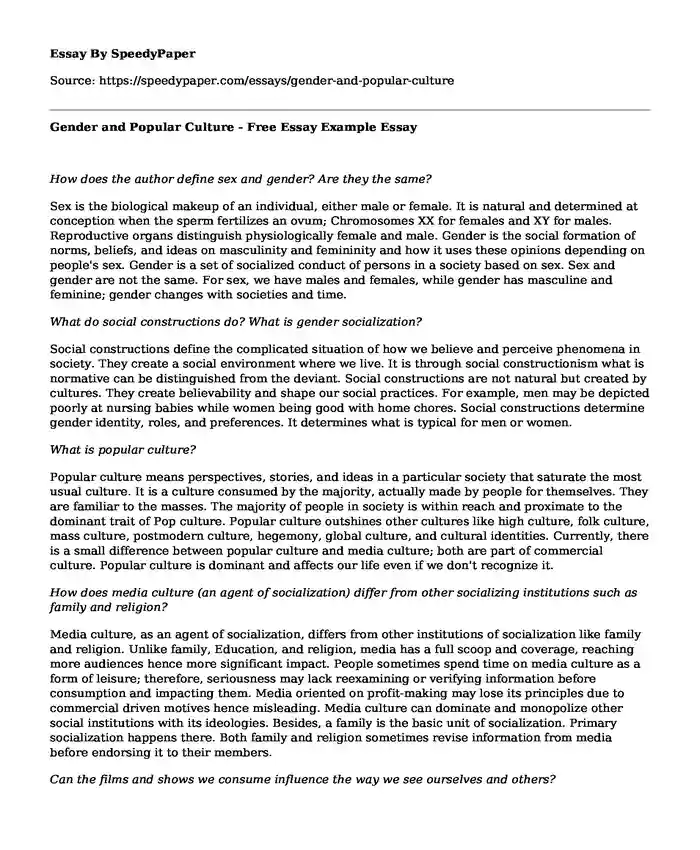
| Essay type: | Reflective essays |
| Categories: | Gender Culture Sexes Social issue |
| Pages: | 3 |
| Wordcount: | 614 words |
How does the author define sex and gender? Are they the same?
Sex is the biological makeup of an individual, either male or female. It is natural and determined at conception when the sperm fertilizes an ovum; Chromosomes XX for females and XY for males. Reproductive organs distinguish physiologically female and male. Gender is the social formation of norms, beliefs, and ideas on masculinity and femininity and how it uses these opinions depending on people's sex. Gender is a set of socialized conduct of persons in a society based on sex. Sex and gender are not the same. For sex, we have males and females, while gender has masculine and feminine; gender changes with societies and time.
What do social constructions do? What is gender socialization?
Social constructions define the complicated situation of how we believe and perceive phenomena in society. They create a social environment where we live. It is through social constructionism what is normative can be distinguished from the deviant. Social constructions are not natural but created by cultures. They create believability and shape our social practices. For example, men may be depicted poorly at nursing babies while women being good with home chores. Social constructions determine gender identity, roles, and preferences. It determines what is typical for men or women.
What is popular culture?
Popular culture means perspectives, stories, and ideas in a particular society that saturate the most usual culture. It is a culture consumed by the majority, actually made by people for themselves. They are familiar to the masses. The majority of people in society is within reach and proximate to the dominant trait of Pop culture. Popular culture outshines other cultures like high culture, folk culture, mass culture, postmodern culture, hegemony, global culture, and cultural identities. Currently, there is a small difference between popular culture and media culture; both are part of commercial culture. Popular culture is dominant and affects our life even if we don't recognize it.
How does media culture (an agent of socialization) differ from other socializing institutions such as family and religion?
Media culture, as an agent of socialization, differs from other institutions of socialization like family and religion. Unlike family, Education, and religion, media has a full scoop and coverage, reaching more audiences hence more significant impact. People sometimes spend time on media culture as a form of leisure; therefore, seriousness may lack reexamining or verifying information before consumption and impacting them. Media oriented on profit-making may lose its principles due to commercial driven motives hence misleading. Media culture can dominate and monopolize other social institutions with its ideologies. Besides, a family is the basic unit of socialization. Primary socialization happens there. Both family and religion sometimes revise information from media before endorsing it to their members.
Can the films and shows we consume influence the way we see ourselves and others?
In what ways?
Films and shows we consume influence the way we see ourselves and others. When someone sees someone alike in a show and conditioned to act in a limited manner that does not represent your situation, one is confused about the expectation of society. When not portrayed in plays and films, you may wonder whether your existence matters. Films have caused low self-esteem among children, especially when they do not look or appear like the 'perfect' person they see on the screen. Films may shape one's opinion towards other people; for example, if Mexican in a movie as violent and drug cartels someone who watches the video without prior information on Mexicans may tend to think of them as passionate people.
Reference
Leavy, P. L. (2007). The feminist practice of content analysis. Feminist research practice: A primer, 223-248.
Cite this page
Gender and Popular Culture - Free Essay Example. (2023, Aug 27). Retrieved from https://speedypaper.com/essays/gender-and-popular-culture
Request Removal
If you are the original author of this essay and no longer wish to have it published on the SpeedyPaper website, please click below to request its removal:
- Essay Example: Organizational Design and Structure
- Free Essay with Criminal Psychology Research on Recidivism
- Free Essay on Whether Television Is Worth Watching
- Free Essay on Cultural Diversity in Healthcare
- Paper Example: Ethical Issues in Information System
- What is one possible reason for kidney failure? Free Essay
- Free Essay. Types of Employees That Should Be Empowered in an Organization
Popular categories




